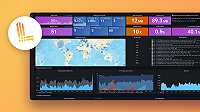Enforce rate limits and push request validation
Loki will reject requests if they exceed a usage threshold (rate limit error) or if they are invalid (validation error).
All occurrences of these errors can be observed using the loki_discarded_samples_total and loki_discarded_bytes_total metrics. The sections below describe the various possible reasons specified in the reason label of these metrics.
It is recommended that Loki operators set up alerts or dashboards with these metrics to detect when rate limits or validation errors occur.
Terminology
- sample: a log line with structured metadata
- stream: samples with a unique combination of labels
- active stream: streams that are present in the ingesters - these have recently received log lines within the
chunk_idle_periodperiod (default: 30m)
Rate-Limit Errors
Rate-limits are enforced when Loki cannot handle more requests from a tenant.
rate_limited
This rate limit is enforced when a tenant has exceeded their configured log ingestion rate limit.
One solution if you’re seeing samples dropped due to rate_limited is simply to increase the rate limits on your Loki cluster. These limits can be modified globally in the
limits_config block, or on a per-tenant basis in the
runtime overrides file. The config options to use are ingestion_rate_mb and ingestion_burst_size_mb.
Note that you’ll want to make sure your Loki cluster has sufficient resources provisioned to be able to accommodate these higher limits. Otherwise your cluster may experience performance degradation as it tries to handle this higher volume of log lines to ingest.
Another option to address samples being dropped due to rate_limits is simply to decrease the rate of log lines being sent to your Loki cluster. Consider collecting logs from fewer targets or setting up drop stages in Promtail to filter out certain log lines. Promtail’s
limits configuration also gives you the ability to control the volume of logs Promtail remote writes to your Loki cluster.
per_stream_rate_limit
This limit is enforced when a single stream reaches its rate limit.
Each stream has a rate limit applied to it to prevent individual streams from overwhelming the set of ingesters it is distributed to (the size of that set is equal to the replication_factor value).
This value can be modified globally in the
limits_config block, or on a per-tenant basis in the
runtime overrides file. The config options to adjust are per_stream_rate_limit and per_stream_rate_limit_burst.
Another option you could consider to decrease the rate of samples dropped due to per_stream_rate_limit is to split the stream that is getting rate limited into several smaller streams. A third option is to use Promtail’s
limit stage to limit the rate of samples sent to the stream hitting the per_stream_rate_limit.
We typically recommend setting per_stream_rate_limit no higher than 5MB, and per_stream_rate_limit_burst no higher than 20MB.
stream_limit
This limit is enforced when a tenant reaches their maximum number of active streams.
Active streams are held in memory buffers in the ingesters, and if this value becomes sufficiently large then it will cause the ingesters to run out of memory.
This value can be modified globally in the
limits_config block, or on a per-tenant basis in the
runtime overrides file. To increase the allowable active streams, adjust max_global_streams_per_user. Alternatively, the number of active streams can be reduced by removing extraneous labels or removing excessive unique label values.
Validation Errors
Validation errors occur when a request violates a validation rule defined by Loki.
line_too_long
This error occurs when a log line exceeds the maximum allowable length in bytes. The HTTP response will include the stream to which the offending log line belongs as well as its size in bytes.
This value can be modified globally in the
limits_config block, or on a per-tenant basis in the
runtime overrides file. To increase the maximum line size, adjust max_line_size. We recommend that you do not increase this value above 256kb for performance reasons. Alternatively, Loki can be configured to ingest truncated versions of log lines over the length limit by using the max_line_size_truncate option.
invalid_labels
This error occurs when one or more labels in the submitted streams fail validation.
Loki uses the same validation rules as Prometheus for validating labels.
Label names may contain ASCII letters, numbers, as well as underscores. They must match the regex
[a-zA-Z_][a-zA-Z0-9_]*. Label names beginning with __ are reserved for internal use.
missing_labels
This validation error is returned when a stream is submitted without any labels.
too_far_behind and out_of_order
The too_far_behind and out_of_order reasons are identical. Loki clusters with unordered_writes=true (the default value as of Loki v2.4) use reason=too_far_behind. Loki clusters with unordered_writes=false use reason=out_of_order.
This validation error is returned when a stream is submitted out of order. More details can be found here about the Loki ordering constraints.
The unordered_writes config value can be modified globally in the
limits_config block, or on a per-tenant basis in the
runtime overrides file, whereas max_chunk_age is a global configuration.
This problem can be solved by ensuring that log delivery is configured correctly, or by increasing the max_chunk_age value.
It is recommended to resist modifying the default value of max_chunk_age as this has other implications, and to instead try track down the cause for delayed logged delivery. It should also be noted that this a per-stream error, so by simply splitting streams (adding more labels) this problem can be circumvented, especially if multiple hosts are sending samples for a single stream.
greater_than_max_sample_age
If the reject_old_samples config option is set to true (it is by default), then samples will be rejected with reason=greater_than_max_sample_age if they are older than the reject_old_samples_max_age value. You should not see samples rejected for reason=greater_than_max_sample_age if reject_old_samples=false.
This value can be modified globally in the
limits_config block, or on a per-tenant basis in the
runtime overrides file. This error can be solved by increasing the reject_old_samples_max_age value, or investigating why log delivery is delayed for this particular stream. The stream in question will be returned in the body of the HTTP response.
too_far_in_future
If a sample’s timestamp is greater than the current timestamp, Loki allows for a certain grace period during which samples will be accepted. If the grace period is exceeded, the error will occur.
This value can be modified globally in the
limits_config block, or on a per-tenant basis in the
runtime overrides file. This error can be solved by increasing the creation_grace_period value, or investigating why this particular stream has a timestamp too far into the future. The stream in question will be returned in the body of the HTTP response.
max_label_names_per_series
If a sample is submitted with more labels than Loki has been configured to allow, it will be rejected with the max_label_names_per_series reason. Note that ‘series’ is the same thing as a ‘stream’ in Loki - the ‘series’ term is a legacy name.
This value can be modified globally in the
limits_config block, or on a per-tenant basis in the
runtime overrides file. This error can be solved by increasing the max_label_names_per_series value. The stream to which the offending sample (i.e. the one with too many label names) belongs will be returned in the body of the HTTP response.
label_name_too_long
If a sample is sent with a label name that has a length in bytes greater than Loki has been configured to allow, it will be rejected with the label_name_too_long reason.
This value can be modified globally in the
limits_config block, or on a per-tenant basis in the
runtime overrides file. This error can be solved by increasing the max_label_name_length value, though we do not recommend raising it significantly above the default value of 1024 for performance reasons. The offending stream will be returned in the body of the HTTP response.
label_value_too_long
If a sample has a label value with a length in bytes greater than Loki has been configured to allow, it will be rejected for the label_value_too_long reason.
This value can be modified globally in the
limits_config block, or on a per-tenant basis in the
runtime overrides file. This error can be solved by increasing the max_label_value_length value. The offending stream will be returned in the body of the HTTP response.
duplicate_label_names
If a sample is sent with two or more identical labels, it will be rejected for the duplicate_label_names reason.
The offending stream will be returned in the body of the HTTP response.



